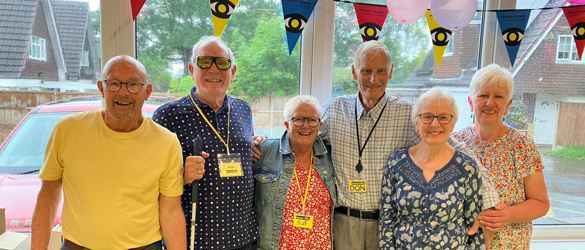
Supporting someone with macular disease?
Understanding sight loss
It can be difficult to understand central vision loss. It may even appear that a person can see some things when they want to. This is because parts of the macula may still be working.
Talk to the person affected. Try to understand how their sight has changed and how they want to be supported.
Two useful questions to ask someone with a macular condition:
1. What can you see and not see?
Understanding the person’s sight loss can help when making simple changes to home lighting, room layouts or buying low vision equipment. Remember, any change has to suit the person with the condition, not what you feel is right.
2. It’s common for people losing their sight to see things that aren’t there. Have you noticed anything like that?
As the brain adapts to sight loss it’s common to experience visual hallucinations known as Charles Bonnet syndrome. Some people enjoy their hallucinations, but others find them distressing.
Find out more about visual hallucinations.
Providing support
A macular condition can bring practical, financial and emotional changes for those diagnosed, and for their family and friends.
Depending on the amount of sight lost, they may need help with:
- paperwork, shopping or cooking at home
- choosing suitable low vision aids
- contacting welfare or social services
- adapting lighting in the home.
People with a macular condition can become reliant on others to complete some everyday tasks for them. Everyone is different, and so is the level of help they want or need.
It is important to respect individual abilities and allow someone to carry on with everyday tasks, even if they don’t do them to your standard.
It can be very difficult for you, as someone providing support, to ‘let go’. However, it’s important that the person with the macular condition remains as independent as possible.
Top tip: Local councils provide a social services assessment for anyone whose daily life is being affected by their sight loss. They could offer rehabilitation training, low vision aids and practical help to ensure people with sight loss can continue to live independently.
Emotional support
The experience of being diagnosed with a macular condition can be like the grieving process. People may experience loss, denial, anger and depression before acceptance. Their personality can change.
Someone with a macular condition won’t look any different from before they developed the condition. However, they may not be able to recognise friends and family. This can be distressing. Some people with macular conditions worry that they appear rude because they may walk past people they know without realising.
People with a macular condition often have to give up driving because of their sight loss. This can be upsetting, but doesn’t necessarily mean the end of a social life. They can still keep in touch with friends and even make new ones, such as through our support groups.
Help yourself too
Supporting someone with a macular condition is a long-term commitment. Anyone providing support needs to consider what help they can offer and what support they need.
Don’t be afraid to ask for help from family, friends and health and Social Services. We’re here for you too.
Providing support for someone else can be demanding. You may be doing this alongside other responsibilities, such as working and/or raising a family. At times you may feel ill-equipped, frustrated, overwhelmed or afraid of the future. These feelings are normal. Good planning and support networks can make a huge difference.
You don’t need to cope alone. Your support circle could include other family, friends, your GP, others in a similar situation, the Macular Society, and of course the person with the condition.
Join a support group
Would you like to join a six-week online group set up to support friends and family who are living with or supporting someone with macular disease?
Led by a trained counsellor, the sessions offer a safe, confidential group space for you to chat to other people with similar experiences and share how you’re feeling.
Please contact our Macular Society Helpline for more information.
The future
Living with macular disease is a journey for you and for the person with the condition. Further sight loss, even years after first diagnosis, may still be upsetting. It may evoke the same feelings as when first diagnosed.
The Macular Society is here for you at every stage.
Free confidential advice and support
Call our helpline on 0300 3030 111
Lines are open 9am - 5pm Monday to Friday.
Or email help@macularsociety.org to find out how we can help.
Macular Society Helpline
Free information and support to those with macular disease, along with their family and friends, to help people retain their independence.
Local support groups
Our support groups are for people of working age and older, and provide information, support and friendship to people with macular disease and sight loss. Find your local support group today.
Counselling
Are you dealing with the emotional challenges of macular disease? It can help to speak to a professional counsellor, who is trained to listen and to talk through your feelings and help you find ways of dealing with them. This service is for anyone who has been diagnosed with macular disease or their family members. Use our free service today.
Telephone befriending
If you feel isolated, our telephone befrienders can provide a regular friendly phone call. You can talk about living with macular disease, or not - the conversation is guided by you.
Join our community at the Macular Society
Become a member today and get your first six months free
From practical tips for dealing with sight loss to the latest research into treatments and a cure; we’re here to help you Beat Macular Disease.
Start your free six months free trial today





